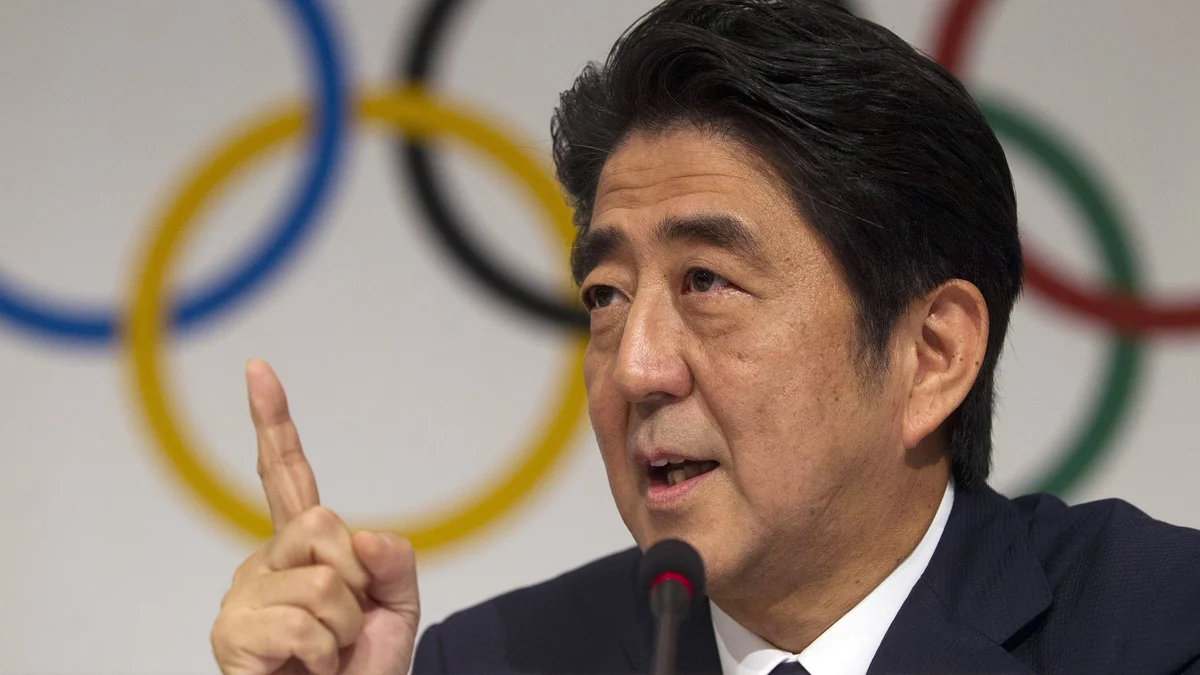Crime
Former Japanese PM Shinzo Abe Assassinated While Making Election Speech

Former Japanese Prime Minister Shinzo Abe has died after he was shot on Friday while campaigning in the city of Nara.
Public broadcaster NHK said he appeared to have been shot from behind by a man with a shotgun.
Authorities have arrested a 42-year-old man who appeared to have shot Abe, media reported.
Kyodo news agency and NHK said Abe, 67, appeared to be in a state of cardiac arrest when taken to hospital, after having initially been conscious and responsive.
He has however been confirmed dead.
NHK showed video of Abe making a election campaign speech outside a train station when two shots rang out, after which the view was briefly obscured and then security officials were seen tackling a man on the ground. A puff of smoke behind Abe could be seen in a separate video shown in NHK.
TBS Television reported that Abe had been shot on the left side of his chest and apparently also in the neck.
Political violence is rare in Japan, a country with strict gun regulations.
Abe served two terms as prime minister to become Japan’s longest-serving premier before stepping down in 2020 citing ill health.
But he has remained a dominant presence over the ruling Liberal Democratic Party (LDP), controlling one of its major factions.
His protege, Prime Minister Fumio Kishida, goes into Sunday’s upper house election hoping, analysts say, to emerge from Abe’s shadow and define his premiership.
Kishida suspended his election campaign after Abe’s shooting and was returning to Tokyo, media reported.
The government said there was no plan to postpone the election.
The ambassador of the United States, Rahm Emanuel, said he was saddened and shocked by the shooting of an outstanding leader and unwavering ally.
“The U.S. government and American people are praying for the well-being of Abe-san, his family, and the people of Japan,” he said in a statement.
Abe is best known for his signature “Abenomics” policy featured bold monetary easing and fiscal spending. read more
He also bolstered defence spending after years of declines and expanded the military’s ability to project power abroad.
In a historic shift in 2014, his government reinterpreted the postwar, pacifist constitution to allow troops to fight overseas for the first time since World War Two.
The following year, legislation ended a ban on exercising the right of collective self-defence, or defending a friendly country under attack.
Abe, however, did not achieve his long-held goal of revising the U.S.-drafted constitution by writing the Self-Defense Forces, as Japan’s military in known, into the pacifist Article 9.
He was instrumental in winning the 2020 Olympics for Tokyo, cherishing a wish to preside over the Games, which were postponed by a year to 2021 because of the COVID-19 pandemic.
Abe first took office in 2006 as Japan’s youngest prime minister since World War Two. After a year plagued by political scandals, voter outrage at lost pension records, and an election drubbing for his ruling party, Abe quit citing ill health.
He became prime minister again in 2012.
Abe hails from a wealthy political family that included a foreign minister father and a grandfather who served as premier.
First elected to parliament in 1993 after his father’s death, Abe rose to national fame by adopting a tough stance toward unpredictable neighbour North Korea in a feud over Japanese citizens kidnapped by Pyongyang decades ago.
Though Abe also sought to improve ties with China and South Korea, where bitter wartime memories run deep, he riled both neighbours in 2013 by visiting Tokyo’s Yasukuni Shrine, seen by Beijing and Seoul as a symbol of Japan’s past militarism.
In later years, Abe refrained from visiting in person and instead sent ritual offerings.
Crime
Police Foil Cult Initiation in Anambra, Arrest Six Suspects

The Anambra State Police Command has foiled a cult initiation ceremony in Nawfia, Njikoka Local Government Area of the state.
Spokesperson for the Command, SP Tochukwu Ikenga, disclosed this in a statement issued on Tuesday in Awka.
According to Ikenga, the operation was carried out by police operatives around 9:30am on June 15, leading to the arrest of six suspects at the scene.
Recovered during the raid were one Jojef pump action gun, two cartridges, and a golden-coloured Lexus SUV with registration number ATN 202 AE. Other items found include two cutlasses, two scissors, a cap bearing the inscription of the Supreme Vikings Confraternity, charms, and substances suspected to be hard drugs.
“They are currently undergoing police interrogation to get more insight into their modus operandi, after which the case will be charged to court on the conclusion of the investigations,” Ikenga stated.
The police spokesperson reassured residents of the command’s unwavering commitment to fighting cultism and other related crimes across the state.
Crime
Court remands 2 over alleged attempted murder

An Ikeja Magistrates’ Court, Lagos, on Wednesday, remanded two persons, Olaitan Fasasi and Kehinde Tobiloba in a correctional facility over alleged attempted murder.
Fasasi, 40, and Tobiloba, 26, whose addresses were not provided, are being charged with conspiracy, attempted murder and membership of a secret society.
The Magistrate, Mr L.A Owolabi, did not take the plea of the defendants for want of jurisdiction.
Owolabi directed the police to forward the case file to the Director of Public Prosecution for legal advice.
He thereafter adjourned the case until May 31 for mention.
The Prosecutor, Josephine Ikhayere, told the court that the defendants committed the offences at about 5.02p.m on Feb. 15, at Mushin, Lagos.
She said that Fasasi, Tobiloba and others now at large, attempted to commit murder by shooting at a resident, Alfred Ademola.
“They armed themselves with a locally made gun. They belong to Eiye Confraternity, a group proscribed by law,”, she said.
Ikhayere said that the offences contravened Sections 230(1) and 411 of the Criminal Law of Lagos State, 2012.
He said that the actions of the defendants also contravened Section 2(3)(a)(b)(c)(d) of the unlawful societies and Cultism Law of Lagos State Law.
Crime
Man jailed 3 months for stealing mobile phone

An Area Court in Jos, on Tuesday, sentenced one Jeptha John, to three months imprisonment for stealing a Redmi mobile phone valued at N165, 000.
The judge, Shawomi Bokkos, sentenced the John after he pleaded guilty to the offence.
The judge, however, gave the convict an option to pay N20, 000 fine and N50, 000 restitution to the complainant.
Bokkos said that if the convict defaulted in paying the restitution, three months should be added to his sentence to make it six months imprisonment.
Earlier, the police prosecutor, Insp Monday Dabit, told the court that the case was reported at the B Division Police Station, Jos, on Dec. 1, 2024, by Ms Nerat Danjuma.
He said that the complainant alleged that the defendant trespassed into her house and stole her mobile phone valued at N165, 000.
The prosecutor further told the court that the offence contravened the Plateau State Penal Code, Law of Northern Nigeria.
-

 Headlines4 years ago
Headlines4 years agoFacebook, Instagram Temporarily Allow Posts on Ukraine War Calling for Violence Against Invading Russians or Putin’s Death
-

 Headlines4 years ago
Headlines4 years agoNigeria, Other West African Countries Facing Worst Food Crisis in 10 Years, Aid Groups Say
-

 Foreign4 years ago
Foreign4 years agoNew York Consulate installs machines for 10-year passport
-

 News1 year ago
News1 year agoZero Trust Architecture in a Remote World: Securing the New Normal
-

 Entertainment3 years ago
Entertainment3 years agoPhyna emerges winner of Big Brother Naija Season 7
-

 Headlines2 years ago
Headlines2 years agoNigeria Customs modernisation project to check extortion of traders
-

 Entertainment2 years ago
Entertainment2 years agoMovie download platform, Netnaija, announces closure
-

 Economy2 years ago
Economy2 years agoWe generated N30.2 bn revenue in three months – Kano NCS Comptroller














